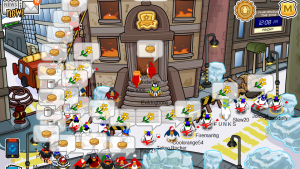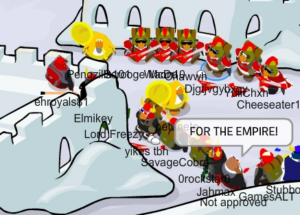Club Penguin Armies has always had leadership philosophies. Every leader has their own philosophy, and parts of that are often passed down from leader to leader. Today, Small/Medium Army Legend Dillon shares his views on leadership philosophy.

My leadership style was influenced by several leaders, at different points in my life. Ioioluk and Roberto of Light Troops fame (unknowingly) gave me the first ingredients of a leadership philosophy in my 9-year-old brain. Revan, Eyes521, and Bam117 gave me more ingredients. It was my job from there to combine all of these into a meal.
The First Lessons
One of the first lessons I learned in CPA was to not take it too seriously. At the end of the day, this is a community where people log on to a penguin game and spam emotes at each other. This is not a serious community, and it never has been. To treat it as such is stressing yourself, and sucking the fun out of it. Focus on the fun, and if you’re not having any, you’re doing all this wrong.

UMA vs. Army Republic
Another lesson I learned early was to make your troops feel like more than cogs in a machine, or in our case, numbers in a results post. This was one I learned subconsciously but played a huge role in how I treated people when I became a leader. Back when I was new to armies, LT’s leaders privately chatted with troops on Xat to get them to log on for events. They would also (perhaps reluctantly) speak to me about life in general. For someone going through so many things back then with nobody around to talk to, this was a godsend.
Regardless of if they knew it or not, this had an impact on both me as a person and as a future leader. I made it a point to at least attempt to get to know the troops, to make them more important to me and the army as a whole, regardless of rank. I made sure to avoid making them simply someone who is told to log on for an event.
The Second Lessons
In 2017, I had been around the block a few times. By this time, I had already been in CPA for 5 years on and off, and seen multiple wars and many armies rise and fall, but made it a point to return to the community. We all know what I did in 2017. I’ve talked about it to death, revived it, and then talked about it to death again, so let’s focus on what I learned.
During the first few months of my leadership, the Underground Mafias Army was largely on its own. At the time, Bam and Eyes didn’t really talk to us much, much less any of the other former UMA leaders, so we were mostly on our own. However, Revan of the Water Vikings and Marines fame logged onto the UMA Club Penguin Rewritten Xat one day. I knew Revan around this time from his time in LT and Marines and had spoken to him a bit, and he ended up becoming an advisor for a period. Revan reinforced many of the ideas that I had already learned but also helped me learn the fundamentals of leading an army.

2017 UMA War Against Romans
When Eyes eventually started talking to the leaders during the summer of 2017, the first thing I learned from him was to not let anyone tell me how to lead. He emphasized the importance of ensuring that UMA was distinctly mine, while still recognizable as UMA. I took this lesson to heart. I combined many of my interests with what I felt were the best elements of UMA’s culture. The edginess, the antagonistic nature, and the sort of “UMA vs. Everybody” mentality. These three things, in my opinion, define my UMA’s culture, and are why I am critical of modern armies, and especially more recent UMA revivals.
The Payoff
I think the payoff was present in the fact that my leadership and CPR era UMA as a whole are proof that you don’t need to treat CPA as a job to be a notable or successful army. My UMA’s notability was despite my outright refusal to take CPA seriously. On the opposite side of the same coin, perhaps our notability was because I refused to take it seriously. Regardless, it happened. And of course, I ended up a community legend and at least to some degree responsible for the modern era of Club Penguin Armies.
Without my philosophy, I am not sure if any of this happened. I certainly didn’t/don’t have the patience to take CPA seriously. To me, for all of the things you could learn in this community, it’s still a community based around emoting in a group against another group.
Conclusion & Leadership Trees
To believe that you as a leader are not influenced by those who you saw lead is foolish. The attitude, beliefs, and the style of leaders that you watch and serve under, especially when you are younger, absolutely influence you and your philosophy. It is simply up to you to acknowledge it.
I think that CPA should adopt a coaching tree structure, similar to professional sports. This way, we could follow and see the lasting impact someone had on a community, by following who they either directly or indirectly taught how to lead. You could then see who the former trainee ended up training, and it would allow us to paint the picture of how a single leader ends up influencing armies indirectly for 3, 4, or 5 years after they retire.
I think it would be fascinating, and something we should consider. Imagine seeing the leadership tree of someone like Oagalthorp or Wgfv, and seeing how what they did as leaders influenced someone in the modern era, or being able to trace the beginnings of a philosophy.
Undeniably, the philosophy of those who taught us how to lead and how to deal with the army community as a whole has a massive impact on our mindset. The concept of leadership trees is indeed very interesting, and something that would be very nice to see in practice. Do you agree with Dillon and his views? What philosophy inspired you and still influences you?
Dillon
Reporter-in-Training
[…] “Philosophical Influences On Leadership” Written by Dillon […]